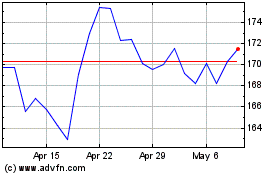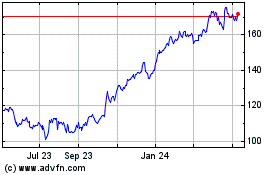Progressive Corp. (PGR) this week introduced on the national
stage a new type of car insurance that offers a discount to
policyholders based on real-time information about how and when
they drive.
Such technology could herald a new era in auto insurance, and
Progressive, which took more than a decade to hone the product, now
has a leg up on its U.S. rivals, industry analysts said. But in the
cutthroat world of auto-insurance, such competitive advantages have
rarely lasted for long.
Other insurers--most notably Allstate Corp. (ALL)--are working
hard to catch up with their own usage-based insurance offerings.
Progressive, through the courts and in discussions with regulators,
is working to retain the edge it has over its competition for as
long as possible.
"In almost any pursuit, it's easier to be second," Progressive
Chief Executive Glenn Renwick said in an interview Wednesday. "But
our head start here counts for something...It's a powerful position
to be in."
The program, called "Snapshot," is optional for Progressive
customers. With a small device that plugs into a car's onboard
diagnostic computer, Progressive can measure--in real time--when
policyholders use their vehicles, how far they drive and how hard
they brake. Customers who install the device can get a markdown on
their auto insurance of as much as 30% after 30 days, and lock in a
discount when they mail the device back after six months. Their
rates won't go up based on the findings.
Auto insurers have typically evaluated potential customers by
comparing them to others who share similar characteristics. Young
single men, for example, have a substantially higher chance of
getting in an accident than other demographic groups, and typically
pay higher premiums.
But data from an individual driver trump any effort to pool
people with similar characteristics. With the Snapshot program,
Progressive can offer discounts to people who drive in a safer
manner than the usual metrics would suggest. They might find a
young single man who shows signs of being a defensive driver,
someone who uses the car only on weekends, or others whose habits
wouldn't be shown by the standard information insurers gather about
their customers.
"Snapshot is underwriting based on how people are actually
driving," said Joe Reifel, a partner with consulting firm A.T.
Kearney. "It clearly will make the pricing of insurance more
accurate."
Progressive is tight-lipped about just how much of an advantage
it gets by collecting such data.
Renwick has said the device installed by customers in their cars
is "reasonably expensive," and profit margins in the auto-insurance
business are notoriously small. So the company's willingness to
offer discounts averaging 10% to 15% offers some clue as to the
effectiveness of the data. And here is another hint: In a moment of
candor several years ago, one Progressive executive told a group of
insurance analysts that a single factor measured by the on-board
device, which he didn't name, was as good at predicting a
customer's potential to get into an accident as age, gender and
marital status combined.
Comments such as that one show why other U.S. insurers are
working hard to come up with their own usage-based products. State
Farm Insurance Cos. and GMAC Insurance already give discounts to
some customers if they allow their OnStar diagnostic systems to
report their mileage. MetLife Inc. (MET), Hartford Financial
Services Group Inc. (HIG) and Erie Indemnity Co. (ERIE) are among
companies testing usage-based offerings, according to a report from
A.T. Kearney.
And in December, Allstate launched Drive Wise, which offers a
similar device and similar discounts to Progressive. It also
determines how many times a driver exceeds 80 miles an hour and
includes that information in calculating a discount. So far, Drive
Wise is available only in Allstate's home state of Illinois.
Allstate said it expects to add a second state by September.
In contrast, Progressive this week said Snapshot is now
available in 32 states and to three out of four car-insurance
customers nationwide. As part of its nationwide rollout this week,
the company began running advertisements on national platforms to
tout the program, a switch from the regional and local ads it had
run before.
Renwick said Progressive's advantage lies with the data it has
already collected. The company said it has gathered more than two
billion miles of data from the Snapshot devices and from the pilot
programs that preceded it. Allstate, in contrast, said in December
it had collected data from almost two million test miles.
"The real issue is what you understand. If I plug this device in
today and get some information, it's pretty much valueless to me"
on its own, Renwick said. "So when we talk about two billion miles
of data, that's critical...I think it is now the single largest
data set we have."
To protect what it has learned from the prying eyes of its
competition, Progressive has convinced state insurance regulators
to allow it to file the required material explaining how it sets
rates in confidence. Regulators can see Progressive's new formulas,
but rivals can't. Such confidential filings appear to be rare;
Renwick said he couldn't recall other instances when it has been
allowed.
Progressive is also turning to the courts to preserve its
advantage. The company sued Allstate in federal court on Jan. 12,
saying its rival infringed on several patents. In its response,
Allstate denied those assertions and asked the judge for a
declaration that Progressive's patents were invalid. The case is
ongoing. An Allstate spokesman declined to comment on the
lawsuit.
Such efforts are only postponing the inevitable. As with other
innovations in auto-insurance underwriting, such as the use of
credit scores to help price coverage, the industry will reach a
point where insurers employing usage-based insurance "will begin to
squeeze out current underwriting models," Reifel said.
"Credit scoring is a good example of how this played out in the
past," Reifel said. "Today, consumers can still get insurance
without a credit score." But the drivers who buy it are far more
likely to have bad credit. This is why the price of such coverage
"is much higher," he said.
With competitors looking to catch up, Progressive is already
working on the next step in usage-based insurance. In a few years,
Renwick said, the company may not need customers to install a
device in their cars to participate in the program. The data could
be gathered from a customer's cellphone instead.
"We have the R&D done," he said. "How we will use it...we
don't know. But mobile is a very interesting proposition for us.
It's the next step."
-By Erik Holm, Dow Jones Newswires; 212-416-2892;
erik.holm@dowjones.com
Allstate (NYSE:ALL)
Historical Stock Chart
From Jun 2024 to Jul 2024

Allstate (NYSE:ALL)
Historical Stock Chart
From Jul 2023 to Jul 2024
